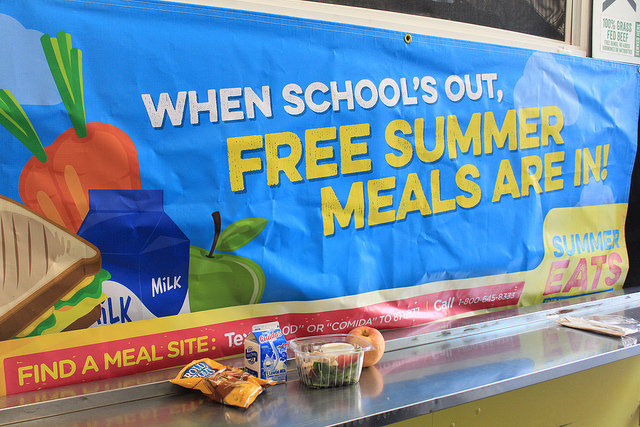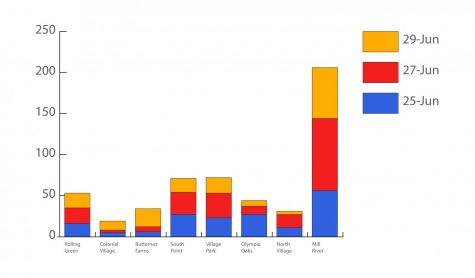The BabyBerk food truck is present at almost every concessions event, catering event and makes rounds around campus until the early hours in the morning. Over the summer, the truck ventured into new territories around Amherst.
The Summer Food Service Program is a federally funded and state-administered program that provides meals to low-income children when school is not in session. It was first introduced to Western Massachusetts this summer with the help of University of Massachusetts Dining.
UMass Dining’s collaboration with the Massachusetts Department of Elementary and Secondary Education and the U.S. Department of Agriculture operated from June 25 to Aug. 10. Announced on June 16, the program expected to serve roughly 600 children a day.
Van Sullivan, director of retail dining, said there was “a very optimistic projection,” and toward the end of the summer, after some word of mouth and traction, they were serving around 400 meals per service day.
Christopher Fisher, manager of food trucks and commissary, said they served about 2,500 total meals to people ages 18 and under.
“I think the collaboration was very successful. We got to do what we do best, they did what they do best and it all turned out to be a bunch of happy kids getting free meals in the summer time,” Fisher said.
“In seven years, I thought we had done it all and this was such a fresh and amazing way to utilize the food trucks in what is usually our off-peak season,” he added.
In the first week of operating, BabyBerk served 559 people. During that week, the most popular location was at the Mill River Recreation Area and the busiest day was June 27.
On Mondays, Wednesdays and Fridays, BabyBerk visited Rolling Green Apartments, Colonial Village Apartments, Butternut Farms Apartments, South Point Apartments, Village Park Apartments, Olympia Oaks Apartments, North Village Apartments and Mill River Recreation Area. The truck’s run began at 10:30 a.m. and would end at 3:30 p.m., stopping at each area for roughly 20 minutes.
Fisher said the Department of Education was “extremely helpful” and made it very easy for UMass to focus on preparing and serving the food. The department certified the sites through census data to find children who were at-risk for hunger and worked with the property owners and managers, making it “exceptionally easy.”
The application for the program needs to be renewed yearly, but UMass Dining plans to continue participating next summer and in the years to come.
Meals varied daily, but entrees often included sandwiches, wraps, burgers, pizza and salads. Sides often included local mixed greens, whole fruit frozen sorbet and fresh fruit. All meals included milk.
For example, on Friday, Aug. 10, the meal included a choice of one percent or chocolate milk, all natural BBQ pulled pork on a bun, local sweet corn and black bean salsa and whole fruit frozen sorbet.
Without the student employees and relying on full-time staff, Fisher chose the three-day-a-week schedule. He believes that even if there was a 10 to 20 percent increase of participants next year, they could handle operating five days a week. He hopes to be more consistent for the children they are serving.
The food truck operated on a staff of two full-time UMass employees. One would be the truck driver and the other a server. On the off-days, those two would prepare the meals and get ready for the service days. The morning of service days, they would come in at 8 a.m., finish preparing and packaging meals and be ready to go by 10:30 a.m. Fisher believes they will be able to continue this program next year with the two employees, even on the increased schedule.
Sullivan said one of the challenges they faced was preparing hundreds of meals without knowing how many participants would arrive at the locations. They had to learn the patterns of the summer and figure out when participation would be the lowest and highest.
He also said it took a little while for the word of mouth to get out but he believes it is something they can do better and improve upon the next year and years to follow.
The initial conversations for the collaboration began last December. In February, the Department of Education and UMass Dining assessed each other’s capabilities for this program and in March, they agreed to move forward. By May, everything was set up, Sullivan explained.
Sullivan said he would be open to collaborations similar to this in the future. Since the program is federally funded, it costs the University next to nothing.
According to Summer Food Service Program’s website, “The SFSP reimburses providers who serve free healthy meals to children and teens in low-income areas during the summer months when school is not in session.”
“As an administrator, as someone who was overseeing this, seeing the potential for good government and seeing three different government agencies coming together… and collaborating together was very fulfilling,” Sullivan said.
“Seeing a child, someone’s kid, getting food. It’s indescribable how cool it was to be a part of that.”
Abigail Charpentier can be reached at [email protected] and followed on Twitter @abigailcharp.





















